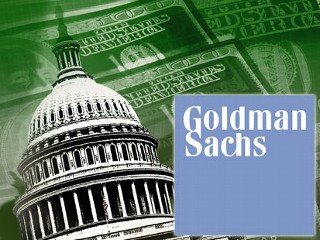LIBOR Scandal, Bad Law, and Bad Law Enforcement
Stephen Bainbridge argues that corporate governance regulation in the wake of scandals and bubbles is almost uniformly bad.
UCLA lawprof Stephen Bainbridge has a lengthy posting on “The LIBOR Scandal and the prospect for bad law.”
Citing research in his latest book, Corporate Governance after the Financial Crisis, he argues that corporate governance regulation in the wake of scandals and bubbles is almost uniformly bad, because it’s enacted hastily and under political pressure and seldom revisited when things settle down.
He is particularly concerned about a call by Bank of England chief Mervyn King, for “‘a total separation between’ retail and investment banking. In other words, he wants a UK version of the USA’s old Glass-Steagall Act.” Bainbridge cites a study published in 2000, the year after that law was repealed by the Congress in what he terms “one of the rare occasions when the ratchet slipped in favor of deregulation,” that finds,
… there is a wealth of historical and empirical evidence showing that bank involvement in the securities business makes financial institutions and the economy safer. In particular, a careful study by Eugene White found that securities activities of commercial banks prior to Glass-Steagall did not impair bank stability. Banks in the securities industry were not riskier (as measured by earnings variance) and did not have lower capital than banks without any securities operations.
More importantly, banks involved in the securities business were less likely to fail than banks that were not involved in the securities business. Five thousand banks failed in the 1920s, but virtually none of these were the city banks that had securities affiliates. Moreover, in the bank failures at the height of the Great Depression (between 1930 and 1933), although more than twenty-five percent of all national banks failed, less than ten percent of the national banks with large securities operations closed.
But, while Bainbridge fears a new Glass-Steagal, he’s not arguing for laissez faire, either.
The LIBOR scandal was caused by roque employees and complicit regulators (the latter being a fact that ought to give even liberal fans of big government pause). It is a form of price-fixing. As such, no one has yet identified any misconduct that is not already illegal under existing laws.
The answer thus is not to bring back Glass-Steagall.
The answer is to enforce the laws that are already on the books.
And, while we’re at it, to ask USA and UK regulators how they–once again (see, e.g., Bernie Madoff)– managed to miss a huge criminal enterprise taking place right under their noses.
One suspects the answer to the last is complicated. My decidedly lay impression is that it’s a combination of under-resourcing of investigative capacity combined with the fact that most of the political appointees—regardless of political party—who oversee these agencies themselves made their millions in the very industry they are charged with regulating and plan to go make further millions in those industries once they’re out of government. Aside from an obvious appearance of impropriety—which in most cases is merely an appearance–that means that they likely see shenanigans that skirt the law as standard operating procedures.







“there is a wealth of historical and empirical evidence showing that bank involvement in the securities business makes financial institutions and the economy safer.”
Citing a study made in 2000 suggests that it may need to be updated based upon the events of the last few years. A study showing that the “securities activities of commercial banks … did not impair bank stability” in the 2008 crash may be more useful.
“My decidedly lay impression is that it’s a combination of under-resourcing of investigative capacity combined with the fact that most of the political appointees—regardless of political party—who oversee these agencies themselves made their millions in the very industry they are charged with regulating and plan to go make further millions in those industries once they’re out of government.”
Add a third item. Since the regulatory agencies’ employees are far underapid compared to their counterparts in the banks, they both attract lesser talent for non-appointed positions to begin with, and that talent is interested in keeping lines open to get hired by the banks they are regulating.
Fraud and perjury are already illegal. If they’re not going to prosecute people doing something illegal, making it more illegal isn’t going to add any more deterence. And perversely, by making up new regulations rather than enforcing the existing ones, you actually end up making it so the only companies that really get punished are the ones that weren’t manipulating the rates, who see their overhead costs go up.
Moosebreath: Take a look at White, Lawrence J., The Gramm-Leach-Bliley Act of 1999: A Bridge Too Far? Or Not Far Enough? (2010). Suffolk University Law Review, 2010. Available at SSRN: http://ssrn.com/abstract=1836668
In 2000, leading economists believed tbat if banks were not regulated they would act in their own self interest and not take on excessive risk. I am concerned that the 1930sER study does not adequately control for size and risk.
As to LIBOR, I understand it is important to try to blame govt, but what would the bankers have done if they had no regulators? Rogues? I am skeptical. This sounds moe like mgt. Was trying to maintain plausible deniability, or at least benign neglect.
Query- Why do bank CEOs make so much money if they dont know what their people are doing?
Steve
Bainbridge is 100% correct. The answer is not more laws nor more regulations. Trying to deal with banking malfeasance with new banking regulations conceptually is akin to responding to a wave of arsons by banning matches and kerosene. Square pegs, round holes, and the long-term negative ripple effects and unintended consequences greatly will outweigh any prospective or even theoretical positive impacts.
The answer here is to enforce existing laws. The Libor manipulation was criminal fraud. You don’t need a fancy new statute nor a scroll of new regulations to prosecute. All you need is the political will to take off the velvet gloves and to strap on brass knuckles.
The argument I’ve heard via left-of-center econ blogs is that US regulation is written too specifically. It is written to ban behaviors 1, 2, and 3, while leaving open 1a, 2a, and 3a. This isn’t surprising really, since the corporate-government partnership you describe includes drafting these laws and regulations.
The left-of-center econ blogs argue that regulators should be given general mandates to protect against excessive risk at large or critical institutions, even to see that large or critical institutions give at least lip service to the public welfare.
We probably don’t have the national guts for it. Instead we’ll suffer with banks and corporations who can say “I did 1a, and not 1, and served my shareholders. That’s all that is required.”
It’s pretty obvious that regulatory enforcement in the financial sector is broken. It’s questionable that cause is insufficient regulations as opposed to lax enforcement, lack of resources, etc. What we should do first is ensure regulators have the necessary resources to do their jobs and then put in rules that ends the revolving door between industry and government to reduce the incidence of regulatory capture. Once those are done, then we can consider whether new regulations are appropriate.
@john personna: I would agree with that. We should embrace the KISS principle with regard to regulation. Not only will this make rules more difficult to game, but it would also reduce compliance costs.
I think the regulatory response is not surprising given the DOJ announcement of the Barclays settlement:
So, the Libor rate already has internal controls that prevent a single bank from manipulating the rate; manipulation would require a conspiracy among several banks.
And it requires a conspiracy among several actors within each bank.
Indeed, the conspiracy was too large and was reported by whistle-blowers. However, since most of the fraud occurred “between 2005 and 2007, and then occasionally thereafter through 2009,” it was largely past activity.
DOJ reached a settlement with Barclays, but it doesn’t preclude criminal prosecution of the individuals involved. If DOJ can prove the accusations its made, I would expect the key players to face jail time; that’s sort of how law enforcement works.
@PD Shaw:
London bankers having whiskey and discussing what would benefit them all? I’m glad that will never happen.
@john personna:
The problem with general mandates is that it leads to arbitrariness on the parts of regulators. Companies can’t tell if they’re in compliance with regulations and whether they are or not ends up depending on which specific examiner comes to investigate them. It also breeds corruption by encouraging people in the government to come down harder or easier on different companies based on their personal financial interests and once they retire to leverage their connections at the regulatory agency to make money as an “unfreezer” who helps companies to manipulate the vague regulations to their advantage.
@john personna: The management of systemic risk is the focus of 21st century regulation. The exotic financial instruments of today would not be recognizable to anyone in the 20s and 30s. I’m just not sure how relevant the referenced study is to the environment of today.
@Stormy Dragon:
To paraphrase Still Life with Woodpecker … it is balancing the crime problem with the cop problem.
@Stormy Dragon:
So what? Who cares if there’s ambiguity for a corporation regarding a certain regulation? And there’s not enough corruption now? Every system in the world is filled with disorder, chaos and unfairness. This is a given.
The financial sector has captured everything that could possibly monitor or regulate it. And it’s used its power to create money out of thin air in these unregulated areas. If people wish to continue down our current path, that’s one thing. But if you think that having an entire world devoted to chasing immaterial gains at the expense of the entire economy, then we shouldn’t be worried about an extra moment of worry for a bond trader or the inevitable corruption that might happen.
The funny thing is that beyond the propaganda about how exciting and exotic trading derivatives is, the actual experience of working on Wall Street is a sad and lonely one. In the end, it’s really an experience not worth doing for most people. It’s just that the financial sector has bought off so many people that their Masters of Universe reflection has proved to be far more durable and enticing than the reality. My experience with Wall Street people is that they’re either happy as hell to be quitting, or that it’s like talking to a wavering ghost.
“there is a wealth of historical and empirical evidence showing that bank involvement in the securities business makes financial institutions and the economy safer.”
There’s a wealth of empirical evidence showing that the man who leapt off the roof of 25-story building was completely safe until he encountered the sidewalk.
I find outstanding that everybody thinks that the whole system is run by crooks and we just shrug it off. Is there no place for integrity? With the pervasive attitude I witness no wonder were are all doomed.
Doggone those “roque employees and complicit regulators” making us bank CEOs look bad!
Stephen Bainbridge,
Having read the article you cite, I don’t see how it can be used to say the repealing Glass Steagall made the economy safer. At the very most, it can be said to say that it made it no less safe.
Moreover, the article seems to rely on a distinction between holding an investment (which the author says caused the insolvency of the banks) and proprietary trading in that investment (which he says, without providing any support for the statement, did not cause it) which does not seem warranted.
@Moosebreath:
Implied in my comment above is that I don’t see much of a difference between “investment” and “proprietary trading”. This wikipedia article does not elucidate it for me — to the contrary, the definition it uses, “Proprietary trading (also “prop trading” or PPT) occurs when a firm trades stocks, bonds, currencies, commodities, their derivatives, or other financial instruments, with the firm’s own money as opposed to its customers’ money, so as to make a profit for itself.” sounds exactly the same as investing to me.
JP. And others
So I apologize for leaving the earlier thread abruptly. The work thingy.
I’ve done some investigation and made some inquiries to people who have insights. It appears that the LIBOR scandal comes down to the banks entering into swaps and then manipulating, through collusion, the LIBOR rate to their advantage. For someone who used to be in the business that’s huge.
I must give the obligatory “we don’t know all the facts and investigations must be made” caveat. But if this is true, it is pure and simple fraud, on a scale I didn’t think possible. I hope we can shed some light on this, because it is despicable. But it appears that the current administration, being big beneficiaries of bank campaign contributions may hush this. A pity.
RICO
Apply the RICO act to the Banking and Financial industries and that would go a long way towards cleaning up their “ethical” problems.
.
Right now the banksters face little jail time and the company is uasally on the hook for the fines so they or their family get to keep a significant amount of the ill gotten money. Getting caught is just seen as another part of business – like long hours or travel.
Until they start facing significant jail time and the loss of all of the money associated with their illegal activities we will not see a return to the safe and sober banker of yesteryear. Now they’re a group of gamblers reminiscent of the mobsters who ran Las Vegas in the 50s and 60s.
RICO
I like the fraud approach. False statements (LIBOR submissions?) made with the intent to induce another who actually relies on the falsehoods and sustains damages is classical fraud right out of a 18th century hornbook
@john personna:
I agree with your description of the problem, but I wonder if this is really true:
Care to elaborate? Isn’t corporate-government collusion the problem the OWS folks were protesting?
I’m with those who say the solution here is to actually enforce the laws we have, rather than try and concoct new regs (that will be watered down by lobbyists anyway) after the horse has left the barn.
People need to go to jail. Important people. Not just “rogue” scapegoats.
That, more than any new regulation, will force a change in behavior. So long as malfeasance is treated with a slap on the wrist and a fine, this sh*t will continue.
You’re dealing with people who, and yes I’m generalizing, appear to have decided that they are special and rules don’t really apply to them. They should be firmly instructed, by example, that they are incorrect.
And I have to say, using RICO on bankers just tickles me.
@Loviatar:” Right now the banksters face little jail time and the company is uasally on the hook for the fines so they or their family get to keep a significant amount of the ill gotten money. Getting caught is just seen as another part of business – like long hours or travel.”
I don’t think RICO reallyl matters. Whatever the crime, the sentence is going to depend primarily on (1) how much money was involved, (2) how many people were victimized, (3) whether anybody was physicall harmed, and (4) whether they targetted a vulnerable population.
The case against Barclays is for an “attempted” crime; so its possible that any sentence, whether RICO or wire/securities fraud, might only be a few years.
And if there was any ill-gotten loot received, there would be a restitution judgment, regardless of the crime.
“Whatever the crime, the sentence is going to depend primarily on ”
Whoever has the best lawyers, as always.
Steve
@Drew:
Who says the subjunctive is dead in English?
The point of Glass-Steagal is to make financial institutions smaller, and, thus, easier to resolve when they fail (bank management is clearly incompetent.) It doesn’t address massive price-fixing conspiracies, but it would help ‘too big to fail’ problems as well as reduce regulatory capture. Another idea is to actually start enforcing antitrust laws, which have languished since the Reagan administration decided to start redistributing money from the middle class to corporations.
@PD Shaw:
Conspiracy is the prosecutor’s friend.
@sam:
You can deny, Sam. It’s just some Internet site. But look at the bucks. I’m sorry if reality conflicts with your worldview.
http://www.zerohedge.com/contributed/2012-07-11/us-gave-tens-billions-libor-manipulating-banks-even-after-knowing-about-manip
Process this as you wish.
Looks like your boy dodged a bullet, though:
LIBOR Banker Bails on Romney
@Scott F.:
They were held off, weren’t they, far from the corridors of power? To use the castle analogy, not even the moat was crossed.
@Drew:
My only would quibble would be:
Professor Bainbridge is just another in the long line of UCLA econ and biz school whack jobs following down the path of Thomas Sowell and William Allen and the Chicago school.
UCLA Profs gave us the “New Deal” made the Depression worse study, debunked by almost all their peers, but of course massively embraced in the wingnut sphere.
Similarly with Bainbridge and his ilk…I guess the Pecora hearings in the Senate for two years was just a lark and that the folks back then were just too stupid to realize that ““there is a wealth of historical and empirical evidence showing that bank involvement in the securities business makes financial institutions and the economy safer.”
Thank god nuts like Bainbridge et al weren’t listened to in the 30s as they would be looked upon quite rightly as academic buffoons who entirely miss the bigger picture.
We can put this in the category of “tariffs and not slavery caused the civil war”, “FDR was responsible for Pearl Harbor because of his oil embargo” and the “Founding Fathers founded a Christian nation”
My UCLA degree is cheapened by such bullshit.
@john personna:
No doubt the Occupiers were held off, but my take is that this outcome was less about “national guts” than it was about “national wherewithal.” Historically, the people with the courage to stand up and protest (the “national guts” folks) must bring attention before the people with the power can possibly bring change.
The OWS movement was just the first wave to storm the drawbridge. I’m hopeful there will be more.
JP
I wouldn’t argue. I think there have Beene flavors and different intensity. But the general thrust I acknowledge.
Quite right.
Because, in the infamous words of Dick Durban “they frankly own the place.”
http://www.realclearpolitics.com/video/2009/04/29/sen_durbin_banks_own_the_place.html
“Bainbridge cites a study published in 2000, the year after that law was repealed by the Congress in what he terms “one of the rare occasions when the ratchet slipped in favor of deregulation,” that finds,
… there is a wealth of historical and empirical evidence showing that bank involvement in the securities business makes financial institutions and the economy safer. In particular, a careful study by Eugene White found that securities activities of commercial banks prior to Glass-Steagall did not impair bank stability. Banks in the securities industry were not riskier (as measured by earnings variance) and did not have lower capital than banks without any securities operations.”
That pretty much sums up all we need to know about him, doesn’t it?
@Moosebreath: “Citing a study made in 2000 suggests that it may need to be updated based upon the events of the last few years. A study showing that the “securities activities of commercial banks … did not impair bank stability” in the 2008 crash may be more useful.”
Krugman has covered this (a very useful phrase). In short, the rollback of New Deal regulations has been matched by an increase in banking instability. We just ignored the ‘minor’ problems in the 1980’s and 90’s.
@Stephen Bainbridge: Stephen, you might want to read something written in this millenium.
However, it is inspiring that you can soldier on, even through this Great Crash, ignoring all around you. Reminds me of those stories we used to laugh at, about economists during the 1930’s.